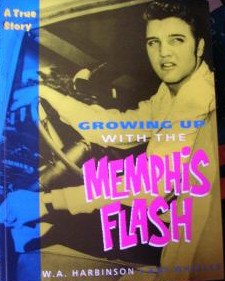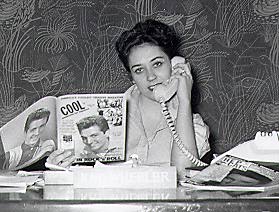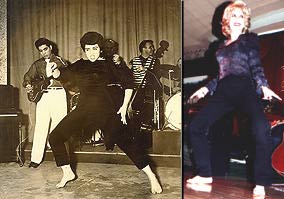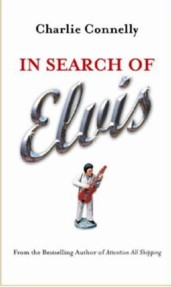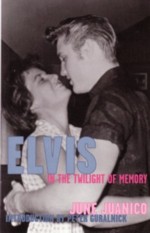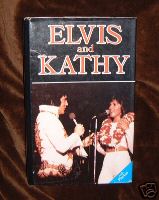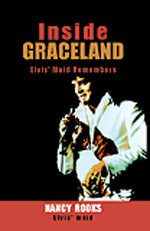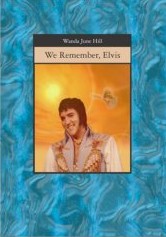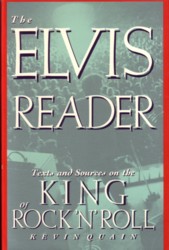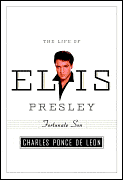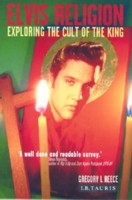 |
 |

Harbinson, W.A. with Kay Wheeler. Growing up with the Memphis Flash. Tutti Frutti Productions, Amsterdam, The Netherlands, 1994. 223 pp. Reviewed by Susan MacDougall, February 2008 Kay Wheeler, who among other things, is "the very first white female who was ever headlined as the "QUEEN OF ROCK & ROLL", in the starring role of the cult 1957 rock movie called "ROCK BABY, ROCK IT." The vintage film is currently available through RHINO video. Rhino advertises the film as, "The most sought after of all the '50s rock & roll films featuring early rock legend, Kay Wheeler..." Kay was originally "discovered" by a rock promoter named J.G. Tiger when she danced at a Johnny Carroll rock & roll concert at the Palace Theater in Dallas, Texas in 1956.
Except in the copious photographs, Elvis doesn’t feature much in the book until Chapter 8 and Kay doesn’t meet him until Chapter 9. Kay only met Elvis a few times in 1956 and was in the audience of one of his press conferences in Los Angeles in 1957. But because she was so taken with him, she started the first Elvis Presley fan club. After nearly becoming one of his conquests in what she described as her “Shreveport experience” in December 1956, she became disillusioned by his behaviour as well as by the toned-down Elvis who was being turned into a bland product. She loved what Elvis had represented: the freedom, originality and excitement of rock and roll music. For her, the Memphis Flash ceased to exist in 1957. Overview The first few chapters cover Kay’s childhood and set the scene in boring middle class America (top of the pops: “How Much is That Doggy in the Window” and “Oh, Mine Papa”) for the impact of rock and roll - the exciting new music that teenagers loved and parents hated. Kay was smitten by rhythm and blues and rock and roll and mesmerised by Elvis. She held Saturday night teen parties where she danced in an uninhibited Rock and Bop style. In 1955 she told a radio DJ that she had an Elvis Presley fan club, which he announced on air. After that, she had so much mail from fans that she had to start the fan club. This led to authorisations to meet Elvis backstage from Colonel Parker’s office. She met Elvis during his Texas tours of April and October 1956 in San Antonio, Fort Worth, Dallas and Waco. Her publicised statement that Waco was a square town because of its unenthusiastic response to his concert led to a falling out with Colonel Parker, after which the backstage invitations stopped arriving.
In Shreveport, Louisiana, after attending the Louisiana Hayride (December 1956) she went to see Elvis at his hotel and was directed into a bedroom by a member of the Memphis Mafia. When she finally met Elvis he tried some “hip grinding” with her. This was definitely not what she wanted and she was no longer mesmerised by him. In November 1957 Kay attended the Hollywood pre-conference and press showing of Jailhouse Rock. Elvis recognised her in the audience and acknowledged her with a greeting. But by the time Elvis went to Hollywood Kay could see that he had changed for the worst, losing some of his inner glow. Kay was not only disillusioned about him as a person but also sorry to see the direction his music was taking. Following two failed marriages, Kay’s disappointment at the direction of Elvis’s career, and the death of her friend Gene Vincent at 36 years, Kay had cause to reflect that material success was not as important as spiritual peace. She turned to Christianity and twice started a mission for drug addicts, alcoholics, petty criminals and prostitutes. The final pages of the book, where she has a sudden brainwave, leave the reader guessing about her intentions, but they’re not hard to work out. Discussion Kay’s book provides a window into 1956 and 1957 at a pivotal time in Elvis’s career. It is informative to compare her perceptions with those of June Juanico (Elvis in the Twilight of Memory, Arcade Publishing, New York, 1997).
Elvis had talked to June about future marriage. Barbara Hearn was expecting an engagement ring forChristmas 1957, but instead received a Sunbeam electric razor!! There seems to have a watershed in Elvis’s life before which he proposed to various girlfriends, and after which he had a succession of casual partners. This watershed seems to have occurred around late 1956. “Elvis died when he went into the army” (John Lennon): a fair number of people must feel similarly to John Lennon and Kay Wheeler about the demise of the first wave of rock and roll. There are still people around today who think that Elvis’s only good music was his rock and roll music. It was certainly his most lively and intense music. But anyone who followed Elvis’s career right through will know that rock and roll wasn’t even Elvis’s favourite music; it was just one of the many styles that he sang. His Vegas concerts packed a powerful punch. People who are interested in only one genre of music, rock and roll, are not Elvis fans, which is fair enough. Maybe Elvis fans concentrate more on the personality than the music, although that is debatable. Elvis’s music was/is integral to him as a person. Anyway, human beings don’t stay frozen in time: they develop in new directions. In the 1960s Elvis was on a spiritual search. Writing him off as a has-been when he went into the army, music-wise or as a human being, is somewhat dismissive and unfair. Summary Kay Wheeler’s book contains matters in common with June Juanico’s. Each different perception of Elvis is part of a mammoth jigsaw puzzle. Whether we’ll ever see the whole picture is another matter. Growing up with the Memphis Flash is interesting reading. Kay obviously realised that what fans want is pictures of Elvis. These they get, some we’ve seen before, others new. Even though Kay had infrequent contact with Elvis over a short couple of years, her story captures the essence of the impact of Elvis on teenagers, whether they met him or not, in the 1950s in the USA as well as elsewhere. For those who remember, it is a nostalgia trip. For those who were not around then, the account provides a vivid idea of what it was like to be a teenager in the 1950s. It is well worth a place on the bookcase.
February 2008 Read other book reviews by Susan MacDougall:
|
|
